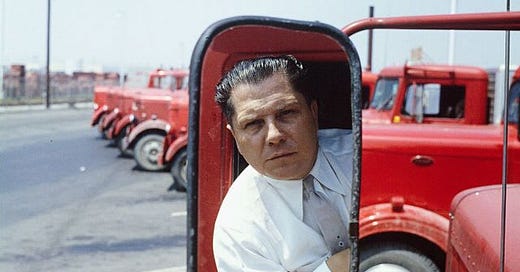Last week I wrote a story fort The Ringer about truck drivers. Working on it got me thinking about the Teamsters and Jimmy Hoffa, a subject that came up frequently while researching Hot Springs and the gambling business in the 1950s and 1960s.
I was drawn to these stories about Jimmy Hoffa in Hot Springs because I spent many years traveling the US and Canada as a union organizer. I went to Austin, Texas after high school to attend college without any financial aid or money in my pocket, and I worked three jobs while I tried to manage a full load of classes. One of those three jobs was a union job, which introduced me to a world I didn't know much about growing up in Arkansas. I got involved in the local trying to sign up other members and eventually was invited to go to an internship in Washington, DC one summer to help the union lobby Congress. I didn't much care for lobbying, but while there I met a number of union organizers who made a big impression on me. I had grown used to people on a college campus who talk a lot about big ideas but don't do much other than write and talk. These organizers were some of the first people I had met in my life who not only had big ideas about how the world should be, they actually put those ideas into practice. When I listened to them talk, they made me believe that things that used to seem abstract were actually possible, because they were doing the work to make it so. When I got back to college I told my union rep I wanted to be an organizer. She helped me get a job with the union. I left college about a semester short of graduating, quit my three part time jobs, and drove to a shitty motel in Gun Barrel, Texas to go meet with workers at a lamp factory who had been getting injured on the job. It was the first of what would be many dozens of these campaigns I'd work on across the country over the next fifteen years.
Jimmy Hoffa became a union organizer after organizing a strike at the Kroger warehouse where he worked as a teenager. He was 19 years old. The Detroit Teamster local noticed him, particularly how fearless he was, and they offered him a job helping the local organize other shops. Four years later the young Hoffa was elected president of the Local. He rose through the ranks of the Teamsters union during a period of time that the union was exploding in growth.
Hoffa's popularity and power in the union stemmed from two things - his rapport with the members, who saw him as a down-to-earth, relatable guy, and his brilliance as an organizer. It was Hoffa who spearheaded the union's use of strikes and "secondary boycotts" to grow the membership at a rapid clip, leveraging the union's power in one segment of a business to bring in members in another related segment.
One of Hoffa's greatest contributions to the Teamsters and to the American economy is probably his commitment to organizing the over-the-road trucker, a job that the Teamsters had considered too difficult to organize and had sworn off. In the 1930s and 40s the over-the-road trucker did an incredibly dangerous job for very little money. When Hoffa was still young and starting out with the Teamsters he was assigned to a local in Minneapolis to help them with a campaign to organize these truckers. The International Union considered the campaign a lost cause, but the head of the Minneapolis local, a Trotskyist named Farrell Dobbs, believed in the campaign. Dobbs saw the drivers as a crucial lynchpin in the economy, and therefore had the potential for real power over employers. He also saw the drivers as possible missionaries of the union, who could travel from town to town and spread the gospel of working class organization wherever they went. Dobbs not only organized a strike against all the trucking companies in Minneapolis, he parlayed it into a city-wide general strike that lead to the governor declaring martial law and deploying the National Guard. The strike was violent but resulted in thousands of new union members throughout Minneapolis, including the truckers and all of the warehouse workers they delivered to.
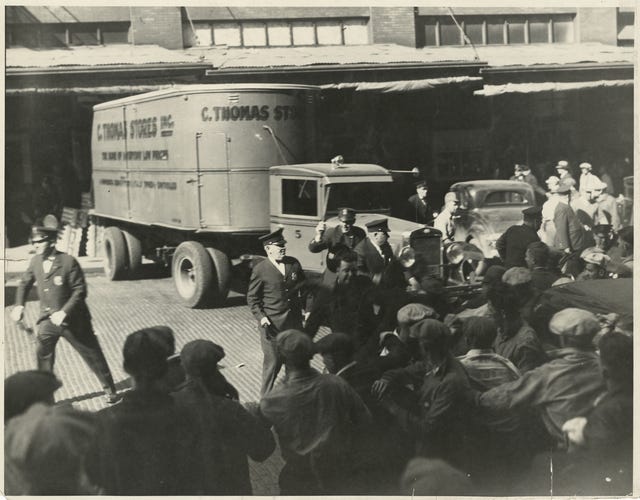
The general strike lead to Hoffa buying in to Dobbs's vision whole hog, and as Hoffa rose in power he invested the union more and more into organizing truckers. By the time Hoffa was elected president of the Teamsters in 1957, the union had over a million members, with 400,000 over the road truckers. In 1964 Hoffa brought all of the truckers in the union under one master contract with all of the unionized employers. Through this master contract Hoffa and the Teamsters effectively controlled the trucking industry in the United States, which meant they controlled most of the economy, since a trucking strike could cripple commerce. The drivers saw their wages and benefits balloon to levels never before imagined by the rank and file truck drivers. Jimmy Hoffa was beloved by his members and despised by the Federal Government.
Along the way from teenage warehouse worker to most powerful man in America, Jimmy Hoffa forged an alliance with organized crime. The mob had control over a number of companies in many of the industries the Teamsters were organizing, so there was some strategic advantage to working with them. From the mob's point of view, labor unions provided a fount of money through health and pension funds, a legal mechanism to shut down competing businesses to their legitimate investments, a place to employ criminals in need of pay stubs for the IRS, and most importantly the political influence necessary in many cities to keep cops and judges at bay. This arrangement not only lead to more members and power for the Teamsters, the use of the Teamsters Central States Pension Fund as a bank for organized crime figures who wanted to build casinos financed a casino construction boom in Las Vegas in the early to mid 1960s, an arrangement that made the mob untold hundreds of millions of dollars. The man who was largely responsible for pushing the syndicate to cozy up to the labor movement was a Chicago gangster named Murray Humphreys, who was one of the most powerful men in American organized crime and a frequent visitor to Hot Springs, Arkansas.
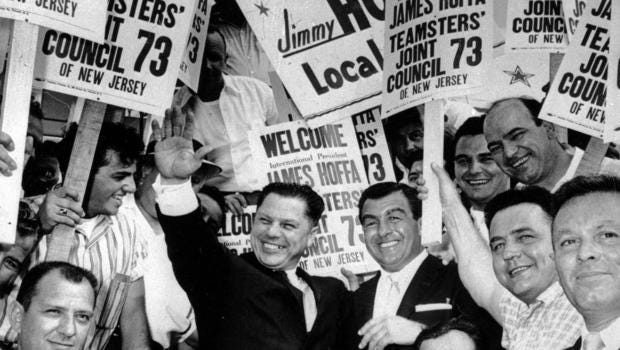
Hoffa managed to get himself into some hot water over his involvement with organized crime. Robert Kennedy had a particular hard-on for putting Hoffa in jail. Kennedy acted as chief counsel for the Senate's Subcommittee on Investigations in the 1950s. It was there that he first discovered Hoffa's alliances with the mob. He pushed hard to get the committee chairman, John McClellan from Arkansas, to focus on union corruption and in particular on Hoffa. Kennedy had said that Hoffa was not just the most powerful man in labor but "the most powerful man in America, next to the President." In 1957 Kennedy believed they had Hoffa dead to rights when an informant revealed that Hoffa was being fed documents from the committee's investigation. A Grand Jury indicted Hoffa. When Kennedy was asked what he'd do if Hoffa was acquitted of the charges, Kennedy was so sure of conviction he replied "I'll jump off the Capitol dome." The case ended with a hung jury. Hoffa's attorney offered to mail Kennedy a parachute.
One of Hoffa's attorney's during that trial was Hot Springs's State Senator Q. Byrum Hurst. I've heard the story many times about how Hurst came to represent Hoffa in that trial in Washington, D.C. There's an account of it in Graham Nown's biography of gangster Owney Madden, "Arkansas Godfather." Nown tells a story of an embattled Hoffa calling up Madden and asking him for "a lawyer I can trust." According to Nown's account, Madden merely passes the phone across the table to Hurst.
The real story is less sanguine. The judge in Hoffa's trial, Burnita Shelton Matthews, was the sister of A.D. Shelton, City Attorney for Hot Springs. Shelton and Hurst had grown up together and were close friends. Hoffa's retention of Hurst wasn't the idea of Owney Madden. It was Capone mob hitman (and part-time Hot Springs resident) Ralph Pierce who put the two men together. Hurst arranged for A.D. Shelton to come to Washington, D.C. to have lunch with his sister shortly before the trial began. When Hurst was grilled about what he did for Hoffa outside of this favor during the trial, Hurst replied "I sat there and listened, and when I thought of a question that ought to be asked, I wrote it on a little piece of paper."
President Kennedy had made Robert his Attorney General. As AG Kennedy put together a "Get Hoffa Squad" of over 20 prosecutors who ran Grand Juries all across the country to try to find something to pin on Hoffa and remove him from power. Robert Kennedy was furious at his inability to close the net on Hoffa. He may have been equally passionate about shutting down gambling in Hot Springs. While Kennedy was calling Hoffa the most dangerous man in America, he also was calling Hot Springs "the largest illegal gambling operation in America." Throughout the 1950s as the Senate Investigations Committee managed to put one gambling town out of business after the other, Hot Springs persevered. Some believed it may have been the influence of the committee's chairman, Senator McClellan, who received contributions and support from the likes of Owney Madden, Q. Byrum Hurst, and the many casino owners and gamblers of Hot Springs. Whatever the reason, once John F. Kennedy was elected president, there were only two places left in America where someone could gamble out in the open: Las Vegas, Nevada and Hot Springs, Arkansas. Hoffa's Teamsters Central States Pension Fund had not only made loans to build the casinos in Las Vegas. They had provided the money to build both the Jack Tar Motor Court and the ritzy Aristocrat Hotel in downtown Hot Springs. Hoffa had his fingers in both cities.
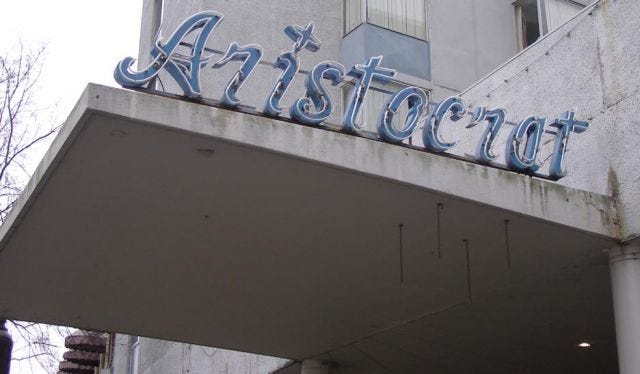
Hoffa grew to dislike gambling in Hot Springs, however. As did many in organized crime who had invested heavily in Las Vegas. Gamblers in Hot Springs were suspicious that Hoffa and the mob were pulling strings behind the scenes to get the state or federal government to shut Hot Springs down. On wiretaps across the country, FBI agents were listening in as mobsters complained about how their local numbers rackets or bookmaking operations were being raided, while these elegant brick and mortar casinos were allowed to stay open in Arkansas. When The Vapors was bombed in 1963, the first thing many suspected was that Las Vegas gambling interests were trying to stir the pot and put political pressure on Governor Faubus, who the gamblers supported with satchels full of money each month, to send in the State Police and close the Hot Springs casinos. When Winthrop Rockefeller, a New York Republican and brother of New York Governor Nelson Rockefeller, announced he would run for Governor of Arkansas, the rumors in Hot Springs were that the Teamsters put him up to it in order to get gambling shut down for good.
By 1964 Kennedy finally succeeded in getting both Hoffa and Hot Springs. After a Teamster official went to the FBI with information about Hoffa's misdeeds he was finally convicted in 1964 to eight years in prison. 1964 was also the year that Hot Springs closed their casinos after Kennedy's chief Justice Department investigator, William Hundley, held a press conference in front of the Majestic Hotel announcing a major probe into illegal gambling. Hundley and his investigators had spent a couple of days gambling in the wide open casinos that lined the streets of downtown Hot Springs and were stunned at the brazenness of it all. "From what I saw down here last night," he said at the conference, "it seems awfully hard for me to comprehend that gambling of this scope could possibly be self contained within the confines of Arkansas." Hundley was alluding to mob influence and involvement in Hot Springs. This was an important point, since locals had long insisted that there was no outside organized crime influence over the gambling business in Hot Springs and as a result it presented no real danger to the people of Arkansas, be it physical or moral. Not long after Hundley's announcement, the casinos held their final night and voluntarily shuttered. (It wasn't to last. The casinos managed to reopen within a year, and some form of wide open gambling remained in Hot Springs until the late 1960s when Winthrop Rockefeller, who did finally replace Faubus and become the first Republican Governor of Arkansas since Reconstruction, sent in the State Police to bust up and burn all the slot machines in the streets.)
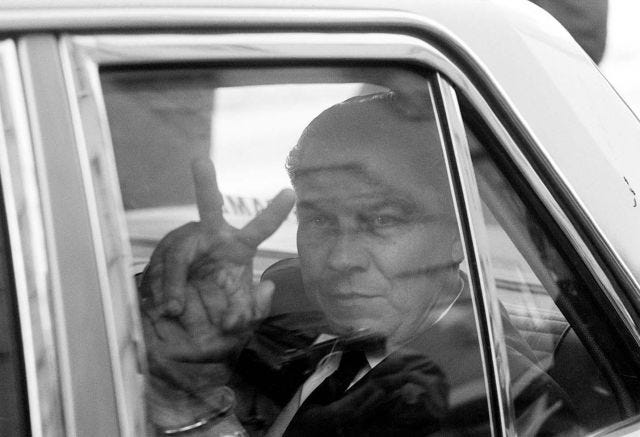
Hoffa vowed to return to the helm of the Teamsters union after prison, but his release, secured through Presidential commutation by Nixon, was conditional on him not participating in union activity until 1980. Hoffa didn't want to wait that long. In the time he was in prison the Teamsters had lost a lot of power and influence. His successor, Frank Fitzsimmons, wasn't half the labor leader Hoffa was. That may have been by design. It's been suggested Hoffa insisted on Fitzsimmons taking over after his conviction so he could control him from prison. Instead, the mob swarmed over the union, bilking it more than ever with little opposition from the union's leadership. While Hoffa was surely corrupt, he was also tough when it came to sticking up for his union. He didn't back down from Robert Kennedy and he didn't back down to Tony Provenzano or Murray Humphreys or anyone else in the mob. Without Hoffa at the helm, there was nobody to push back when the tide of corruption and graft came rolling in.
Hoffa made a lot of noise about how he wouldn't wait until 1980 to return to power. He filed a lawsuit challenging the condition of his release. He threatened to publish a tell-all memoir of his time as Teamsters president. He overestimated his own power and underestimated his enemies' desperation. In the 1970s the mob had grown more brazen and violent than ever. The national crime syndicate that used to run organized crime throughout the country like a well oiled machine had deteriorated. In the 1970s it was every mob for itself. The Teamsters Central States Pension Fund was still the bank of choice for criminals looking to open casinos, and Las Vegas was exploding in growth. A long list of national Teamster leaders were receiving monthly payoffs from the mob's skim of Vegas casinos in exchange for their support for Pension Fund loans. None of them wanted Hoffa to come in and end the gravy train.
On July 30, 1975, Jimmy Hoffa went to the Red Fox Restaurant outside of Detroit to meet with Tony Provenzano, a New Jersey mobster and head of the New Jersey Teamsters Joint Council, and a Detroit mob leader named Tony Giacalone. Hoffa never came home. His wife reported him missing. Police found his car in the Red Fox parking lot, unlocked. But nobody ever saw Jimmy Hoffa again.
The search for Jimmy Hoffa captivated America and was front page news for months. The FBI followed up on leads that had them digging holes in the ground from Michigan all the way to New Jersey. One place the FBI sent a team of investigators in the days following Hoffa's disappearance was Hot Springs, Arkansas.
Chuckie O'Brien was Hoffa's adopted son and a business agent with the Teamsters. He often acted as a go-between for Hoffa and organized crime figures, as well as a bodyguard for Hoffa. In 1975 O'Brien and Hoffa were on bad terms. O'Brien wanted to run for office in Detroit's Local 299 and Hoffa refused to support him. It doesn't seem like a big enough beef to lead O'Brien to kill his adoptive father, but there was plenty of evidence he was involved. O'Brien couldn't keep his story straight about where he was the day Hoffa went missing. There was an eyewitness who saw Hoffa in the backseat of a maroon Mercury, the same car O'Brien drove. The FBI found blood in the backseat of the Mercury and found O'Brien's fingerprints inside of Hoffa's car. Worse yet, the Mercury didn't belong to O'Brien, he had borrowed it from the son of Tony Giacalone.
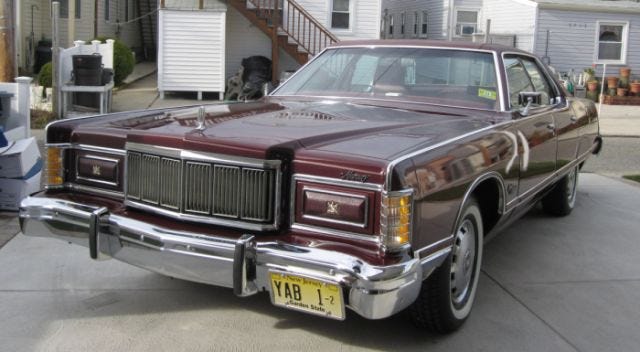
O'Brien became the FBI's number one suspect. When they wanted to bring him in for questioning, he had fled Michigan and was staying in a hotel in Hot Springs, Arkansas. O'Brien's wife, Brenda, was from West Memphis. On the night that Hoffa went missing, O'Brien called his wife who was staying in Arkansas. A few days later after giving some initial and contradictory statements to police, O'Brien flew to Arkansas and met up with Brenda in Hot Springs. He returned to Michigan when the FBI asked him to come in for more questioning, but days later a team of FBI agents arrived in Hot Springs to follow up on leads that Hoffa's remains could be somewhere in the area of the National Park.
The team spent several days in Hot Springs questioning people suspected of being involved. In heavily redacted FBI files, agents detail their interviews with over a dozen people in Arkansas, including two people suspected of renting an airplane on the day of the disappearance and an official at a local air strip. The men admitted to renting the airplane, but denied that they flew it to Detroit. The FBI questioned people about their relationship to both Tony Provenzano and Sam Giancana, the head of the Chicago mob and another frequent visitor to Hot Springs. They also interviewed what appears to be Harry Hastings, Little Rock liquor magnate and crime boss, and silent partner in The Vapors casino. Hastings was questioned about a number of people who were staying at the Holiday Inn on Lake Hamilton in the days after Hoffa's disappearance. Hastings told the FBI that certain "big men" in the Hot Springs area might have been involved in meeting with the mysterious visitors. Most of the interviewees expressed incredulousness at being suspects. A couple seemed to be unsurprised. One was forced to explain to the agents that when he was overheard bragging about being involved in Hoffa's murder, he was misunderstood. He was just expressing his worry that he might be killed if someone thought he was involved, not saying that he was actually involved. Whether or not anyone in Hot Springs was involved in Hoffa's murder, and it's highly unlikely any of them were, it is fascinating that so many residents of Hot Springs had enough of a motive to kill Jimmy Hoffa to warrant a team of FBI agents spending several days combing the town.
Jimmy Hoffa's body was never found, nor were his killers ever brought to justice. O'Brien remained a Teamsters official until he was finally kicked out in 1990 during a purge of Teamsters with connections to the mob. Today Hoffa's son, James P. Hoffa, runs the Teamsters as its International President. He has long suspected O'Brien and continues to hold out hope that DNA evidence or a death bed confession might lead to confirmation. O'Brien is 83 years old and lives in Boca Raton, Florida. He is barred from having any contact with any members of the Teamsters for life.
Everything about the Hoffa story is seductive. Power, corruption, violence, intrigue. But what often gets lost in the conversation about Jimmy Hoffa is that his power came not from his connections to organized crime, but from the more than two million members of the International Brotherhood of Teamsters. Hoffa helped grow a small and regional carting union into an international organization of working men and women with significant economic and political power. Hoffa didn't need the mob to be powerful. The mob needed Hoffa and the Teamsters, and Hoffa obliged them. And while many of his dealings with organized crime were a betrayal of those two million members he served, in retrospect they also were more evidence of the 9th grade dropout's brilliance. The loans that Hoffa made to build casinos in Las Vegas were profitable, and they were all paid back in full to the fund. At one point Hoffa had over 80% of the pension fund's assets invested in real estate alone, with about $600 million to organized crime figures. During that time the pension fund made money and paid out generous benefits to Teamster members.
After Hoffa's disappearance the fund was wracked with scandal. Loans were often secured through threats, or bribes, even a kidnapping. One pension fund trustee, Allen Dorfman, was gunned down in broad daylight in a parking lot. In 1982 the government issued a concent decree ordering the Teamsters to turn the fund over to Morgan Stanley. In the years that Wall Street has controlled the pension fund, they have made investments in junk bonds, in technology stocks before the bubble burst, in Russian banks that have failed and defaulted on the loans. By 2003 the fund was forced to cut benefits for the first time in fifty years. Meanwhile the pension fund, because of bad publicity, cut all ties to Las Vegas in the 1980s. And Las Vegas has grown from a handful of hotel casinos in an out-of-the-way desert rest stop into a multi-billion dollar international tourist destination, with investments pouring in from around the world. Hoffa had bet on the gambling business like he had bet on the power of truck drivers. He was right both times. Like Hoffa was fond of saying, "I may have my faults, but being wrong ain't one of them."
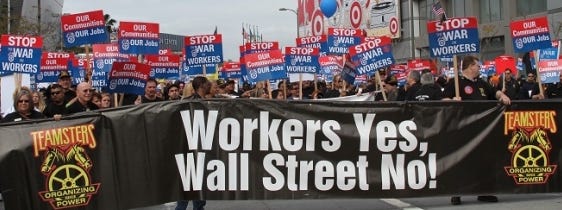
I'm no longer a union organizer, though I look fondly on the days when I was. I believe the years I spent traveling the country talking to workers from all walks of life in their homes and listening to their life stories has made me a better writer. I believe that the time I spent working with them as they took on their bosses against impossible odds and with everything to lose has made me a more courageous, humbler, and better person.
I'm still a union member. I serve as the Vice President of the National Writers Union, which is UAW Local 1981 (and I hope if you're reading this and you're any kind of writer at all you'll join me there). I don't expect there is much I can learn from Jimmy Hoffa in my current role as an officer in a small arts and entertainment union. And for all the good he did, he also did much that was contemptible. But I do take away one important lesson from Hoffa's life and career. Hoffa showed us that the working class can and should hold power in our society. He showed us that working class people can lead, can have wisdom and insight far greater than Ivy League educated lawyers or Wall Street bankers. He showed us that when we organize together in large numbers and with discipline, we can stand toe-to-toe with patrician politicians and wealthy industrialists, even Presidents of the United States. And we can humiliate them. We can bend them to our will.
In solidarity,
David


